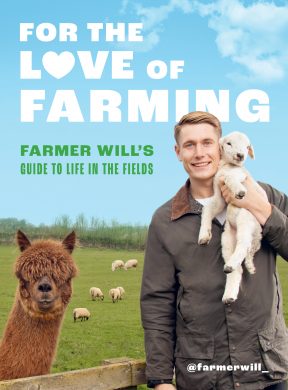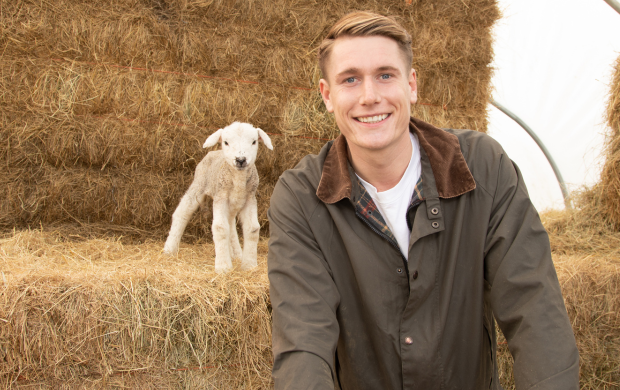For anyone who doesn’t already know who you are, tell us a bit about what you do and how you got the name ‘Farmer Will’…
My name is Will, and I am a sheep farmer from Buckingham, hence the name Farmer Will. I was on the ninth season of Love Island but I had already had a bit of social media presence, mainly through TikTok, before I went on.
I started my TikTok account a couple of years before this, in 2020. I’d been sending videos to my friends during lambing season to show them what it was like, and then one day, I randomly decided to post a video of me lambing a sheep to a techno track on TikTok. People liked it, so I started to post more and more, and well, here we are!
You have nearly 2 million followers on TikTok! Was there a moment when you thought… Wow, this is getting big!..?
I mean yeah, I suppose so! I just really enjoy being on the farm and people seem to enjoy having a window into what goes on. I still post the same things I did when I started so it doesn’t feel like there’s been a massive shift. It’s just nice to know people are still enjoying the videos and seeing my life on the farm.
What made you apply for Love Island Season 9?
I actually did an audition two years before that season – when I had just started on TikTok. They didn’t go ahead with it, but when I look back, I think the reason it flopped is because I wasn’t mature enough. Then Love Island DM’d me two years later to see if I wanted to do another audition – so I did. Because of my experience before, I went through the stages with this underlying belief that I wouldn’t get it, which just made me feel and come across as really relaxed! Then, to my surprise, they were keen to have me on! I was shocked because I’m not your typical Love Island chap.
All in all, it happened really quickly. I’m of the belief that to go on Love Island is a once-in-a-lifetime opportunity, and so if someone offers it to you, it’s silly to turn them down. You just have to go for it, and that’s what I did.
You had a reputation on Love Island for being down-to-earth and entirely yourself. How did you manage that knowing how high the stakes were and with so many people watching?
I was a little bit terrified when I first entered the villa, but when I’m nervous I talk, and I’m a good talker – I just chit-chat away! But everyone was sound and very kind, which helped massively. I am very much 100% my authentic self all the time, and I’m of the opinion that if someone doesn’t like me, then that’s okay. It’s not on me. It’s more to do with them. I went in knowing that I wasn’t going to be everybody’s cup of tea. I think it helped that I’d had experience on social media beforehand – posting things that weren’t to everybody’s taste. So I was already familiar with being myself, even when the stakes were high and with knowing that not everyone was going to like it! Obviously, my first week on Love Island was a bit of a nightmare, stepping forward for girls and not getting picked, but it was alright in the end! When it came down to it, I wasn’t fussed about winning, and neither was Jessie, so I think it came across that we were both relaxed and happy with the spot we were in.
Your new book, For The Love of Farming, is out on October 19th! What’s it about and who is it for?
It’s really for anyone who is interested to find out a bit more about the real inner workings of our farm season by season. Each section details what needs to be done throughout the year to keep our livestock happy and the farm going, and how to do it. It’s basically about my life as a shepherd and aims to spread a positive message of how important having a connection to nature and animals is for our mental health.

How did you get into farming?
So, I’m actually in a family of generational farmers. I’m the sixth generation. That said, it was a bit of a journey for me getting into farming; it certainly wasn’t like I was destined from birth. When my dad was younger, he didn’t have a choice. My dad, Andrew, was the youngest of his siblings, with two older sisters. My grandad was traditional and believed that he had to wait to have a boy to take over the farm, so from 10 years old my, Dad was made to go out on the farm and learn the ropes. Because of that experience, my dad’s attitude towards me and my older brother was very different. We were told to do and go after whatever we wanted, and the farm was there if we were interested. Of course, growing up on a farm meant that we would help out anyway, but it wasn’t my job or an obligation.
When I was 17 to 18, I hit a wall and didn’t know what to do with myself. I didn’t have any qualifications and I didn’t know what I wanted to do…but I did know that I really enjoyed farming, being on the farm, and spending time with my dad and family. I spoke to my Dad, and I started working part-time – part-time on the farm and part-time working in retail in Bicester Village, just to make sure… And then yeah, I loved the farm and went full-time!
On a serious note, what’s happening to farming in the UK at the moment?
Farming has changed so much over the past hundred years: with the cost of things, changes in appetite, and geopolitical influences. My granddad and great aunt were able to attend private school through the money made selling chicken eggs, but you couldn’t make your money that way now. It’s harder to predict things in the industry. There are so many factors and things that impact it. Brexit, the Ukraine war, and international deals that don’t have anything to do with the UK, like the one made between China and Australia recently, these things make it tough.
How can we, as consumers, help support local farms?
Back British farming! The way this can happen is to buy produce that British farmers have made. So when you’re in the supermarket, check the products to see where the food comes from. Although it may cost a little bit more, it is a way to support the farms. It will save the UK from bringing in cheaper produce from different countries and, instead, support local farmers. I saw a statistic which stated that 90% of the public wants to give farmers a fair price. Although it seems good, the 10% of the people choosing not to is a bit of a disappointment, as everyone in the country should back the farming community. Showing support to the farming community is so important, and that can be done in loads of different ways, from buying our produce in the supermarkets to going to Farmers’ Markets, to posting your support on social media to get the word out.
What’s your favourite thing about being a farmer?
There are lots of things. There’s the fact that you’re outside all the time which really helps with having a positive mindset. I’m working with my family and my dad who is like my best mate. Farming is often a family business, and I really value my family, so it means a lot to me. Also, the fact that you’re working with animals (I love animals), means that you just have such a love and care for it. It makes it rewarding.
Of course, there are downsides. It can be very lonely. You can be on your own for a whole day. I compare that to some of my friends, who have a really social work life – going out with their colleagues after work and stuff – it just doesn’t happen in the farming industry. Overall though, farming tops it for me. I love the work ethic farming has taught me, and the lessons about real life.
What are you excited about for the rest of the year and beyond?
There are lots of things to be excited about! The release of For The Love of Farming is a big one. I’ve been working on that for a really long time, so it’s great to see that come to fruition. Beyond that though, I think everything will revolve and evolve around the farm and farming. Farming is something that I love, so a dream would be to visit a bunch of different countries to explore their approach and way of farming and how it varies, experiencing their techniques and learning more about farming in general…we shall see!










